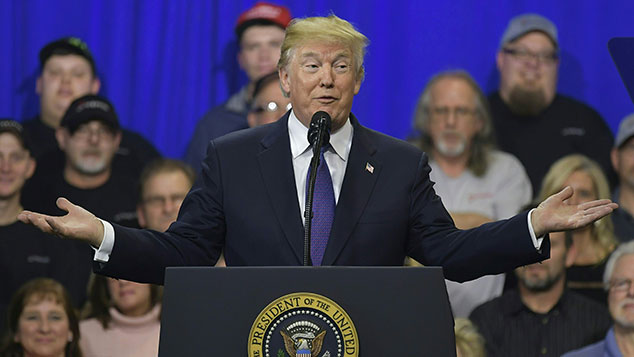
But Trump claims his campaign did nothing wrong. Emily Hohler reports.
“All politicians think first of survival, and Donald Trump is no exception,” says The Times. When Robert Mueller, the special counsel investigating Russian interference in the 2016 US elections, published a 37-page indictment last Friday proving just that, Trump insisted on Twitter that the election results “were not impacted… The Trump campaign did nothing wrong – no collusion”.
The indictment names 13 Russian nationals, 12 of whom are linked to the Internet Research Agency, a “shadowy, Kremlin-connected outfit” alleged to have carried out extensive information warfare before, during and after the campaign, says Adrian Chen in The New Yorker. Conspirators, some posing as ordinary Americans, started posting divisive commentary on social networks designed to cause discord and discredit all candidates apart from Trump and Bernie Sanders.
While Trump may be correct in saying that the indictments do not accuse him of collusion, his unwillingness or inability to defend America against a Russian campaign to undermine our democracy suggests that he is either “totally compromised by the Russians”, a “towering fool, or both”, says Thomas Friedman in The New York Times.
Perhaps Trump’s real-estate empire has taken large amounts of money from shady oligarchs linked to the Kremlin? Or Russian intelligence has a tape of Trump’s “sexual misbehaviour” while in Moscow running the Miss Universe contest? How else can his “quiescence” – or the “extraordinary lengths” to which he has gone to shut down the Mueller investigation – be explained? There is so much he could and should be doing to mount an effective cyber defence, as well as an offence against Putin, yet he refuses to act.
Social media must take some blame The “vital detail” of the Mueller indictments is that most of those involved with the Russian propaganda machine needed no recruitment: they recruited themselves, says Hugo Rifkind in The Times. The “most significant” actions of the protagonists were online, where they created Facebook groups that eventually contained hundreds of thousands of “completely real people”.
We should worry about the Russian agents, but we should worry more “about how little they actually had to do”. Quite, says Anne Applebaum in The Washington Post. Social-media companies “are not accidental victims of Russia’s information war. They are its tools.” They bear some responsibility for the “growing polarisation… in American life” that the Russians tried to exploit.
The Facebook algorithm is pushing all of us into “ever more partisan echo chambers”. At the same time, Facebook argues that it is not responsible because it is not a publisher and therefore not legally liable for any material that appears on its platform. This is nonsense. It “behaves in every other way like one”. Something needs to be done.
Syria’s war is spinning out of control
The seven-year war in Syria is entering “a new and even more dangerous phase”, says Jonathan Marcus on BBC Online. At least 250 people were killed in this week’s bombing by forces loyal to Syria’s president Bashar al-Assad in eastern Ghouta, the rebel-held enclave outside Damascus.
Syria has become a “Hobbesian hell”, says Roger Boyes in The Times. The war started as an uprising against Bashar al-Assad, but there are now a dozen wars being fought in the country: Turkey against the Syrian Kurds, Iran against Israel, Saudi proxies against Qatari proxies, Shia against Sunni. Meanwhile, the US and Russia are “trying to avoid direct confrontation”.
The complexity of the war’s alliances could keep it going for years, even while the conflict that started it appears “headed towards a conclusion”, say Ben Hubbard and Jugal Patel in The New York Times. Anti-government rebels have been pushed into a “few remaining bastions” and Islamic State has lost nearly all of the territory it controlled.
There is no one left to topple Assad. Yet his government forces are depleted, leaving him without enough troops to “clear and hold” the entire country. His foreign backers, Russia and Iran, are calling the shots.
But now other “dangerous international power plays” risk overshadowing the domestic battles, say Erika Solomon and Laura Pitel in the Financial Times. There’s the Turkish offensive in northwestern Syria, which is controlled by the YPG, which Turkey views as a threat to its own national security. And earlier this month an Israeli jet was shot down following a mission over Syria against an Iranian target.“Open conflict” with Israel could provide Trump with the excuse he “yearns for” for a showdown with Iran, says Simon Tisdall in The Guardian. The worry is that “something big, sooner or later, is going to blow”.